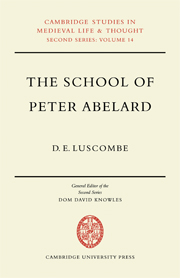Book contents
- Frontmatter
- Contents
- Preface
- List of Abbreviations
- I The Literary Evidence
- II Abelard's Followers
- III The Diffusion of Abelardian Writings
- IV The Condemnation of 1140
- V The Theological Writings of Abelard's Closest Disciples
- VI The School of Laon
- VII Hugh of St Victor
- VIII The Summa Sententiarum
- IX Abelard and the Decretum of Gratian
- X Abelard's Disciples and the School of St Victor
- XI Peter Lombard
- XII Robert of Melun
- XIII Richard of St Victor
- XIV Conclusion
- Appendices
- Bibliography
- Index of Manuscripts
- General Index
X - Abelard's Disciples and the School of St Victor
Published online by Cambridge University Press: 05 November 2011
- Frontmatter
- Contents
- Preface
- List of Abbreviations
- I The Literary Evidence
- II Abelard's Followers
- III The Diffusion of Abelardian Writings
- IV The Condemnation of 1140
- V The Theological Writings of Abelard's Closest Disciples
- VI The School of Laon
- VII Hugh of St Victor
- VIII The Summa Sententiarum
- IX Abelard and the Decretum of Gratian
- X Abelard's Disciples and the School of St Victor
- XI Peter Lombard
- XII Robert of Melun
- XIII Richard of St Victor
- XIV Conclusion
- Appendices
- Bibliography
- Index of Manuscripts
- General Index
Summary
Simultaneously preeminent in the Parisian scholastic scene of the 1130s, Abelard and Hugh of St Victor jointly influenced succeeding writers and even shared disciples such as Zachary, the scholasticus of Besancçon from 1131-8 and later Praemonstratensian canon of St Martin's, Laon. Zachary wrote before 1161 an introduction to the Gospels which achieved popularity and which imparted an Abelardian flavour in respect of the Trinity, the example of Christ and the power of the keys. Several passages in this Super Unum ex quattuor strikingly resemble the Sentences of Hermann and others betray the marks of Victorine influence. But Hugh's school was also a powerful rival to that of Abelard and the originator of a mass of criticisms directed against Abelard which exceeded in their variety and number the criticisms of those monastic writers who attempted to refute Abelard's errors. Since the doctrines of Abelard and Hugh were often contrary, they had to be juxtaposed and collated and, finally, evaluated. This need was recognized in the Concordia discordantium canonum and also within Abelard's school. The circle of writers who made Abelard's thought the basis of their own compositions included several scholars who were ready to employ and to evaluate ideas and material produced in the school of St Victor.
‘ABAELARDI EXPOSITIONIS IN EPISTOLAM AD ROMANOS ABBREVIATIO’
One of Abelard's followers abbreviated Abelard's exposition of Romans. A mere fragment of the work survives and it has been edited by Dr Landgraf from the unique manuscript, Paris, Arsenal 1116.The abridgement is well-enough executed; there is no pronounced bias affecting the omissions and contractions of passages found in the Expositio.
- Type
- Chapter
- Information
- The School of Peter AbelardThe Influence of Abelard's Thought in the Early Scholastic Period, pp. 224 - 260Publisher: Cambridge University PressPrint publication year: 1969

